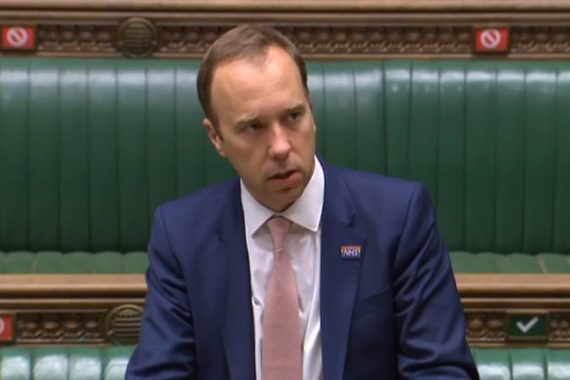Matt Hancock arrived on the scene as health secretary in July 2018 as a low-profile Government minister, who was perhaps most famous for starting his own self-titled social media app.
But he resigned over the weekend as a household name, following the biggest public health crisis in a century and a string of public scandals.
It was the most recent scandal – the publication of leaked pictures showing him kissing an aide, breaking social distancing guidelines – that led to him stepping down and being replaced by Sajid Javid.
Pressure had been mounting on the ex-health secretary for months in light of his and the Government’s response to the Covid crisis, which has so far claimed 130,000 lives – to put into horrible context, government advisers said at the start of the pandemic that 20,000 lives would be considered a success.
Hancock’s role in the response will probably be remembered through the explosive claims by the prime minister’s former aide Dominic Cummings, who said that Hancock ‘lied’ through the pandemic – which he later denied – while Cummings also made public text messages he received from Boris Johnson saying Hancock was ‘f***ing hopeless’.
Hancock has been at the centre of the PPE procurement row, as well as heavily criticised for catastrophic failures with the £37bn Test and Trace system and for not doing enough to protect care homes from the virus at the start of the pandemic.
Hancock would point to the Covid vaccination programme as his major success.
The latest Government figures show more than 44 million people have had their first dose of the vaccine, while 33 million have had their second. The vaccine is said to have saved an estimated 27,000 lives, and prevented 7,000,000 getting Covid.
In the end, Hancock’s legacy as health secretary will almost certainly centre around his performance during the Covid-19 crisis, rather than – as he would probably have expected in 2018 – his reforms to digitise the NHS.
Prior to becoming health secretary, Hancock held positions as junior minister for digital services, and secretary of state for digital, culture, media and sport. So, it came as little surprise that he would be a keen supporter of increasing the use of technology in healthcare.
A few months into his tenure, he announced a ban on practices using fax machines beyond 2020, told GPs to send patients emails rather than letters and pledged that every patient in England would have access to NHS 111 online via the NHS App.
He also set about longer-term reforms, including linking up health records across primary and secondary care, improving NHS IT systems and boosting AI in the NHS.
But these aims too have not been without controversy.
At the time of Hancock’s appointment, BMA GP Committee chair Dr Richard Vautrey warned that technology would not address the problems caused by a lack of trained GPs.
Hancock pitted himself against GPs after endorsing Babylon’s GP at Hand app on several occasions, claiming it does not differ to other GP practices who are also ‘private’.
This led to GP leaders stating that they could not have confidence in Hancock if he were to continue his support for the service, ignoring the ‘value, worth and function’ of general practice.
But none of this caused nearly as much backlash as Hancock’s recent plan to have NHS Digital extract large amounts of patient data from GP records later this year under a new scheme named General Practice Data for Planning and Research (GPDPR).
Pulse revealed last month that privacy campaigners fear the new automatic extractions of data will be ‘far bigger’ and ‘more intrusive’ than the scrapped care.data project.
GPs will, of course, also judge Hancock’s tenure as health secretary based on how well he has responded to the main challenges facing the profession in recent years.
In 2019, Mr Hancock announced a pledge to recruit 6,000 new doctors to general practice and create 50 million more GP appointments a year by 2024/25.
However, recently published figures up to March 2021 show a slight (0.4%) increase in fully qualified GPs at 28,096 – 111 more than in March 2020, with the BMA warning the GP workforce is not growing quickly enough to cope with current or future demand.
Last summer, Hancock also promised that the bureaucracy removed from the NHS due to Covid-19 would not return.
In November 2020, the Government published the response to its much-awaited bureaucracy consultation, which included, among other things, a plan to cut GP appraisals to 30 minutes and a promise to allow more healthcare professionals to issue fit notes.
It’s perhaps too early to judge these long-term goals as a success or a failure, and the pressure will be on the new health secretary to make good on these important promises.
Pulse October survey
Take our July 2025 survey to potentially win £1.000 worth of tokens














Nothing will change—-including the apathy of G.Ps.
I have increased my sertraline dose to 100mg due to current grey apathy.
I think all front-line staff should be signed off for 4 weeks for trauma related to this shenanigan.
Hancock you can shove your app where the sun don’t shine.
In fact you probably did.
Useless tw@t.